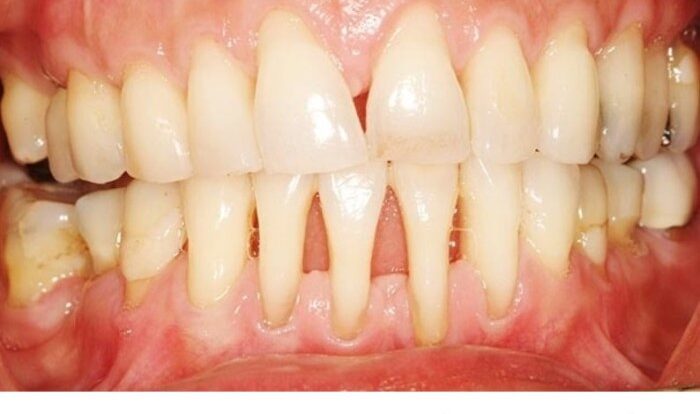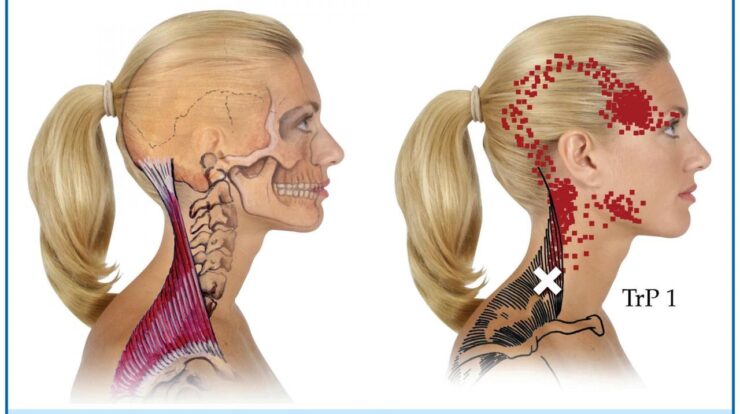
How to cure gum disease without a dentist? This guide unveils a treasure trove of natural remedies, home care techniques, and lifestyle changes to restore your oral health and banish gum disease for good. Get ready to embrace a healthier, more radiant smile!
From the comfort of your own home, discover how simple ingredients like salt and oil can transform your gum health. Learn the secrets of effective brushing, flossing, and water flossing to keep those pearly whites sparkling. Dive into a nutritional journey that nourishes your gums and supports their recovery.
Natural Remedies
Natural remedies can help reduce gum inflammation and pain, and may even help prevent gum disease from progressing.
Salt water rinses are a simple and effective way to reduce inflammation and kill bacteria in the mouth. To make a salt water rinse, dissolve 1/2 teaspoon of salt in 8 ounces of warm water. Rinse your mouth with the salt water for 30 seconds, then spit it out.
You can repeat this process several times a day.
Oil pulling is another natural remedy that may help improve gum health. Oil pulling involves swishing a tablespoon of oil in your mouth for 20 minutes. The oil helps to draw out toxins and bacteria from the mouth. After 20 minutes, spit out the oil and rinse your mouth with warm water.
You can oil pull with any type of oil, but coconut oil is a popular choice.
Herbal teas can also be beneficial for gum health. Green tea, in particular, contains antioxidants that can help to reduce inflammation. To make green tea, steep 1 teaspoon of green tea leaves in 8 ounces of hot water for 3-5 minutes.
You can drink green tea several times a day.
Gum disease is a common problem that can lead to serious health issues if left untreated. Fortunately, there are a number of things you can do to cure gum disease without a dentist. One of the most effective methods is to use a natural mouthwash made with ingredients like tea tree oil, baking soda, and hydrogen peroxide.
These ingredients have antibacterial and anti-inflammatory properties that can help to reduce inflammation and kill bacteria. For more information on how to cure gum disease without a dentist, visit how to cure gum disease without a dentist .
Home Care Techniques
Maintaining a healthy oral hygiene routine is crucial in preventing and managing gum disease. Home care techniques, including regular brushing and flossing, can effectively remove plaque and bacteria from the teeth and gums, reducing the risk of inflammation and infection.
Importance of Regular Brushing and Flossing
Brushing your teeth twice a day with a fluoride toothpaste helps remove plaque and food particles that can accumulate on the teeth. Flossing daily removes plaque and bacteria from between the teeth, where a toothbrush cannot reach. Regular brushing and flossing help prevent plaque buildup, which can harden into tartar and cause gum disease.
Benefits of Using a Waterpik
A waterpik is an oral irrigator that uses a stream of water to remove plaque and bacteria from the teeth and gums. Waterpiks are particularly effective at removing plaque and bacteria from areas that are difficult to reach with a toothbrush or floss, such as the back of the teeth and under the gum line.
Using a waterpik regularly can help reduce plaque buildup, improve gum health, and prevent gum disease.
To get rid of gum disease without a dentist, you can try some home remedies. Some people have had success with oil pulling, where you swish coconut oil in your mouth for 15-20 minutes. You can also try how to cure gum disease without a dentist with over-the-counter mouthwashes that contain chlorhexidine.
If you’re looking for a more natural approach, you can try rinsing your mouth with salt water or using a baking soda paste.
Plan for Effective Dental Hygiene at Home
To maintain optimal oral health and prevent gum disease, it is essential to establish a consistent dental hygiene routine. Here’s a recommended plan for effective dental hygiene at home:
- Brush your teeth twice a day with a fluoride toothpaste.
- Floss your teeth once a day.
- Use a waterpik once a day to remove plaque and bacteria from hard-to-reach areas.
- Rinse your mouth with an antiseptic mouthwash to kill bacteria and freshen breath.
- Visit your dentist for regular checkups and professional cleanings.
Dietary Modifications
Gum disease can be exacerbated by certain foods, while others can promote gum health. Understanding these dietary factors is crucial for supporting gum recovery.
Foods to Avoid:
- Sugary foods:Sugar feeds bacteria that cause gum disease.
- Acidic foods:Acidic foods, such as citrus fruits, can erode tooth enamel and expose the gums to bacteria.
- Sticky foods:Sticky foods, like candy, can cling to the teeth and provide a breeding ground for bacteria.
- Hard foods:Hard foods, such as nuts and hard candy, can damage the gums if chewed excessively.
Foods to Promote Gum Health:
- Fruits and vegetables:Fruits and vegetables are rich in vitamins and antioxidants that support gum health.
- Dairy products:Dairy products contain calcium, which strengthens teeth and gums.
- Whole grains:Whole grains are a good source of fiber, which helps clean the teeth and gums.
- Lean protein:Lean protein, such as fish and chicken, provides amino acids that are essential for gum health.
Sample Meal Plan:
Breakfast:Oatmeal with berries and nuts, yogurt with fruit, or eggs with whole-wheat toast
Lunch:Salad with grilled chicken, fish, or beans, brown rice with vegetables, or a whole-wheat sandwich with lean protein and vegetables
Dinner:Grilled salmon with roasted vegetables, chicken stir-fry with brown rice, or lentil soup
Gum disease can be a pain, but it doesn’t have to be. There are plenty of ways to cure gum disease without a dentist. For example, you can try using a saltwater rinse or an antiseptic mouthwash. You can also try flossing and brushing your teeth regularly.
If you’re looking for more information on how to cure gum disease without a dentist, check out this article .
Snacks:Fruits, vegetables, nuts, or yogurt
Lifestyle Changes
Lifestyle factors play a crucial role in gum health. Understanding the impact of certain habits can empower you to make positive changes that support healthy gums.
Smoking
Smoking is one of the most significant risk factors for gum disease. Nicotine constricts blood vessels, reducing blood flow to the gums. This impaired circulation deprives the gums of essential nutrients and oxygen, making them more vulnerable to infection and inflammation.
Additionally, the chemicals in cigarettes damage the immune system, weakening its ability to fight off bacteria that cause gum disease. Studies have shown that smokers are more likely to develop severe gum disease, experience tooth loss, and have difficulty healing after dental procedures.
Stress Management
Chronic stress can negatively affect overall health, including oral health. When under stress, the body releases hormones like cortisol, which can suppress the immune system and reduce its ability to fight off infections.
Gum disease is a common problem that can lead to serious health issues if left untreated. The good news is that there are a number of things you can do to cure gum disease without having to see a dentist.
One of the most effective ways to cure gum disease is to practice good oral hygiene. This includes brushing your teeth twice a day, flossing once a day, and using mouthwash. You can also try using a natural mouthwash, such as one made with tea tree oil or coconut oil.
These natural mouthwashes can help to kill bacteria and reduce inflammation. If you have severe gum disease, you may need to see a dentist for treatment. However, if you catch it early, you can often cure gum disease without having to see a dentist by following these simple tips.
For more information on how to cure gum disease without a dentist, visit this website .
Stress can also lead to unhealthy coping mechanisms, such as poor oral hygiene habits or increased tobacco and alcohol use, which can further compromise gum health. Finding healthy ways to manage stress, such as exercise, meditation, or spending time in nature, can contribute to better gum health.
Oral Hygiene Habits
Maintaining good oral hygiene practices is essential for preventing and managing gum disease. Brushing your teeth twice a day with a soft-bristled toothbrush and fluoride toothpaste removes plaque and bacteria that can cause inflammation and infection.
Flossing daily helps remove plaque and food particles from between teeth, where a toothbrush cannot reach. Regular dental checkups and cleanings allow your dentist to monitor your gum health, detect early signs of disease, and provide professional cleaning to remove tartar and bacteria.
There are a few ways to cure gum disease without a dentist, including using mouthwash, flossing, and brushing regularly. If these methods don’t work, you can try using a more natural approach, such as visiting Capitol Planning Region Mecconline . They offer a variety of natural remedies that can help to cure gum disease, including herbal teas, essential oils, and supplements.
Using these natural remedies can help to reduce inflammation and pain, and can also help to kill the bacteria that cause gum disease.
Preventative Measures: How To Cure Gum Disease Without A Dentist
Prevention is key when it comes to gum disease. By following proper oral hygiene practices and making healthy lifestyle choices, you can significantly reduce your risk of developing this condition.
Here are some preventative measures you can take:
Proper Brushing Techniques
Brushing your teeth twice a day is essential for removing plaque and bacteria that can lead to gum disease. Here’s how to brush your teeth effectively:
- Use a soft-bristled toothbrush and hold it at a 45-degree angle to your gum line.
- Brush in small, gentle circles, covering all surfaces of your teeth.
- Brush for at least two minutes, paying special attention to areas where plaque tends to accumulate, such as the back of your molars and along your gum line.
- Be sure to brush your tongue as well to remove bacteria that can cause bad breath.
Effective Flossing, How to cure gum disease without a dentist
Flossing is just as important as brushing when it comes to preventing gum disease. Here’s how to floss effectively:
- Use a piece of floss about 18 inches long and wrap it around your middle fingers.
- Hold the floss taut between your thumbs and index fingers and gently guide it between your teeth.
- Curve the floss around the base of each tooth and move it up and down to remove plaque and bacteria.
- Be sure to floss behind your back molars as well.
Types of Mouthwashes
Mouthwashes can help to kill bacteria, reduce inflammation, and freshen breath. Here’s a table comparing different types of mouthwashes:
| Type | Benefits | Considerations |
|---|---|---|
| Antiseptic | Kills bacteria that cause gum disease and bad breath | Can be harsh on the mouth and may stain teeth |
| Fluoride | Strengthens teeth and prevents cavities | May not be as effective against gum disease |
| Anti-inflammatory | Reduces inflammation and swelling in the gums | May not be as effective against bacteria |
| Natural | Contains natural ingredients such as tea tree oil or baking soda | May not be as effective as antiseptic or fluoride mouthwashes |
Last Word

With a holistic approach to gum care, you can kiss gum disease goodbye. Remember, prevention is key! Embrace proper brushing and flossing techniques, choose mouthwashes wisely, and make lifestyle choices that prioritize your oral health. Your gums will thank you for it, rewarding you with a radiant smile that shines with confidence.
FAQ Overview
Can I cure gum disease without seeing a dentist?
While home remedies and lifestyle changes can improve gum health, it’s crucial to consult a dentist for a proper diagnosis and treatment plan.
How long does it take to cure gum disease naturally?
The duration varies depending on the severity of the disease and your commitment to the treatment plan. Consistency and patience are key.
What are the best natural remedies for gum disease?
Salt water rinses, oil pulling with coconut oil, and herbal teas like green tea and chamomile can effectively reduce inflammation and promote gum healing.





